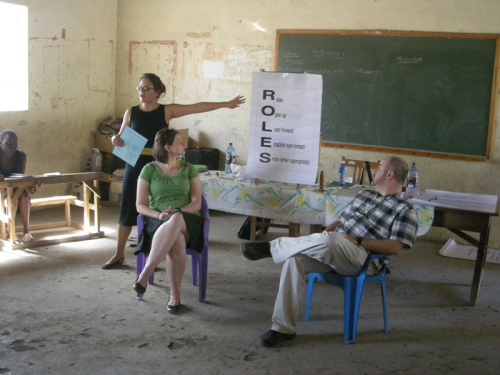May 07, 2009
DePaul's Kenyan Partners in HIV/AIDS Prevention Program First Visit To University And Chicago May 9-16
DePaul's Kenyan Partners in HIV/AIDS Prevention Program First Visit To University And Chicago May 9-16
Four educators from
Gary Harper, a professor of psychology at DePaul and director of the Master of Public Health (MPH) program, and his colleagues will host professional development workshops and a number of tours of
DePaul and KEC have worked together to develop, implement, monitor and evaluate an abstinence and behavior change, school-based HIV prevention program for youth ages 11 to 14 throughout Kenya. Posters, brochures and curriculum guides—developed by Harper; Lexa Murphy, associate professor of communication; Leah Neubauer, associate director of the Department of Psychology’s Adolescent Community Research Group; and Andrew Riplinger, coordinator of the Kenya-DePaul partnership—now serve as aids to improve communication skills-building for grade school educators in need of HIV/AIDS intervention materials for students.
The four KEC staff visiting Chicago and DePaul are: Theresa Abuya, program officer; Julius Ruto, curriculum developer; David Simiyu, data manager and Nicholas Waigwa, a journalist from Radio Waumini, a national Catholic radio station based in
“The exchange will provide an opportunity to utilize the talents and resources of DePaul to help build capacity at KEC as they implement, monitor and evaluate HIV prevention programs for youth in Kenya,” said Harper. “It also gives us a unique opportunity to show our partners American public health and education systems as we continue the ongoing process of cultural exchange.”
The visitors will attend workshops facilitated by DePaul faculty and staff and aimed at imparting interviewing skills to be used with youth and teachers during site visits, radio program scriptwriting and production, and data, grants and quarterly report writing. The radio workshops will assist KEC with the production of mass media health messages that are aired over Radio Waumini.
Educational visits beyond the university will include
According to Harper, one of the biggest obstacles to combating the spread of HIV and AIDS throughout Africa—and one that he and his researchers are helping Kenya overcome—is the failure of people to talk and share information. “AIDS and HIV are around people in
The DePaul-KEC program in

Members of DePaul's HIV/AIDS education team in Kenya hold a school-based training session.
